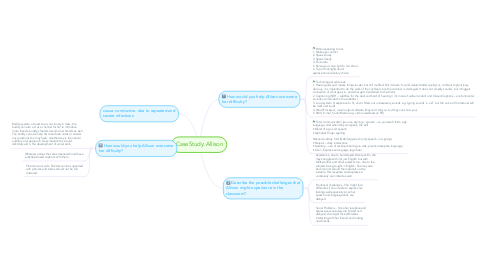Case Study: Allison
by Kamalika Jeevika Selvi Govindasamy Rajasekaran

1. How would you help Allison overcome her difficulty?
1.1. Buddy system, at least she is not lonely in class, the buddy can also act as a channel for her to introduce more friends, buddy's friends become her friends as well. The buddy can also help her take down notes or answer any questions she may have. Another way is the natural auditory oral approach. Daily interactions would definitely aid in the development of social skills,
1.2. Whatever videos that are screened should have subtitles/closed captions with them.
1.3. Provide visual aids. Pointers can be supported with pictures and slides should not be too cluttered.
2. cause: conductive. due to repeated and severe infections
3. How would you help Allison overcome her difficulty?
3.1. When speaking to her: 1. Make eye contact 2. Speak slowly 3. Speak clearly 4. Enunciate 5. Raise your voice but do not shout 6. Tap or flick lights/facial expression/vocabulary choice
3.2. Technological advances: 1. Hearing aids (just makes things louder, but still muffled. But it doesn’t sound clearer/better quality) vs. cochlear implant (very obvious, it is implanted to do the work of the cochlear since the cochlear is damaged. It does not amplify sounds, but it triggers connection of what goes in, and what gets transferred to the brain) 2. Captioning (SDH – subtitles for the deaf and hard of hearing // it’s more of verbal content and Closed Captions – environmental sounds are included in the subtitles ) 3. Loop system (it expensive to fit, and it filters out unnecessary sounds e.g. typing sounds in a LT, but the voice of the lecturer will be clear and loud) 4. Word Processor, visual output software (they can’t tell you, but they can show you) 5. SMS, E-mail, Social Media (e.g. video newsfeed on FB)
3.3. Total communication (you use signing + speech – so you teach them sign language. And when they can speak, the will) • Blend of sign and speech • Alphabet Finger spelling Natural Auditory Oral (NAO) Approach (only speech, no signing) • Natural – daily interactions • Auditory – use of residual hearing via aids; practice receptive language • Oral – Expressive language (sign-free)
4. Describe the possible challenges that Allison might experience in the classroom?
4.1. Academics: due to her delayed literacy skills, she may struggle with not just English but with Mathematics and other subjects too, due to the subjects being taught in English. She may also become lost should the materials not be suitable. Her receptive and expressive vocabulary are limited as well.
4.2. Emotional challenges - She might face difficulties if she unable to express her feelings well especially since her speech and language skills are delayed.
4.3. Social Problems - Since her receptive and expressive vocabulary are limited and delayed, she might face difficulties interacting with her friends and making new friends.


